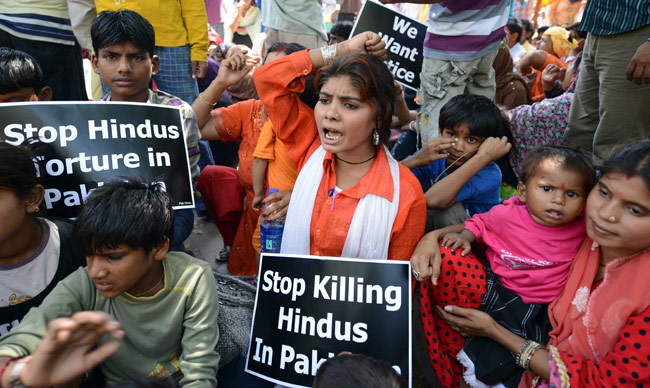Faiths which reduce mankind to a flawed species renounce real convictions and the right to choose. Therefore, when Pakistan’s religious minorities believe that the country’s road to democracy has spelt a slow death for them, it is difficult to disagree.
It was the Pakistan Peoples Party’s (PPP) five-year rule that proved detrimental for the minorities, be it the Shias, Ahmedis, Christians or Hindus.
A supposedly secular party ushered in the worst era of religious militancy and sectarianism, including forced conversions of young Hindu and Christian women.
The PPP’s first three years in power saw a mass exodus of 11,000 Hindus who left Balochistan for India to avoid losing their girls to abductors and another religion.
Cut to January, 2014 and Prime Minister Nawaz Sharif’s PML-N is following a shoddier path. It is determined to court hardliners with an ongoing demand for a peace dialogue, with the result that crimes of intolerance perpetrated by Islamist radicals escalate by the day.
In this week alone, there have been two incidents of forced conversions, which have met with an incensed reaction from the Pakistan Hindu Council, Pakistan Hindu Sewa and the community.
First, a Sindhi Hindu woman, Lucky Bhel, was kidnapped and forced into marriage with the disciple of a local religious leader.
A few days later, Sapna Rani, a Hindu teacher in Peshawar, was recovered after 15 days in captivity. Rani told the magistrate that her tormentor from Bahawalpur had coerced her to convert to Islam to marry him.
Human rights activists say that a minimum of 20 such cases occur almost every month.
Dr Ramesh Kumar, PML-N member in the National Assembly, has vowed to raise the issue at all platforms, including the Parliament and prompt leaders to recall Jinnah’s long-forgotten promise of equality to the country’s minorities, enshrined in the Constitution.
However, the formation of a three-member commission by the Sindh government to consider an edict that halts such heinous violations is a plausible measure.
Pakistan must promulgate an ordinance that prohibits conversion by force and prescribe stringent penalties. Such a law is critical when the country’s marginalised communities view the crime of forcible conversion and the desecration of two Hindu temples this year, as part of the extremist agenda.
So, the establishment must implement neutralisation of the rising Taliban tide with absolute force. Otherwise, Sharif can face an unpalatable reality – the stage is set for Islam’s secular values to be assailed by Islamism.
Reema Abbasi
The writer is a columnist in Karachi
source






























